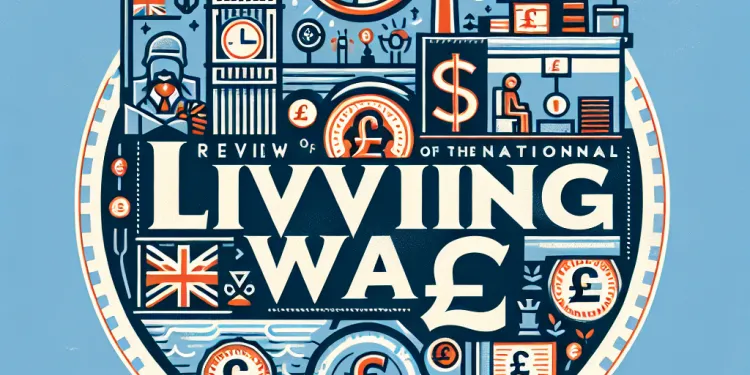
Find A Professional
More Items From Ergsy search
-

How does the National Living Wage differ from the National Minimum Wage?
Relevance: 100%
-

How does the UK National Living Wage compare internationally?
Relevance: 100%
-

Is the Living Wage Foundation's rate the same as the National Living Wage?
Relevance: 98%
-

Who is eligible for the National Living Wage?
Relevance: 94%
-

Why is the National Living Wage being increased?
Relevance: 88%
-

What is the new UK National Living Wage for 2026?
Relevance: 88%
-

How can I calculate my new earnings based on the National Living Wage increase?
Relevance: 85%
-

UK national living wage increase 2026
Relevance: 84%
-

Are employers legally required to pay the National Living Wage?
Relevance: 84%
-

How often is the National Living Wage reviewed?
Relevance: 83%
-

How is the National Living Wage calculated?
Relevance: 83%
-

Where can I find official announcements on the National Living Wage?
Relevance: 82%
-

Are apprentices entitled to the National Living Wage?
Relevance: 80%
-

Are zero-hour contract workers entitled to the National Living Wage?
Relevance: 76%
-

How often do wage rates change in the UK?
Relevance: 68%
-

Liver disease | NHS
Relevance: 61%
-

What happens if an employer pays below the National Living Wage?
Relevance: 58%
-

Will the increase in the National Living Wage affect inflation?
Relevance: 55%
-

Is there a minimum transfer amount required?
Relevance: 40%
-

Does the National Living Wage increase mean my taxes will change?
Relevance: 38%
-

What are National Trust Jobs?
Relevance: 37%
-

What is the National Trust?
Relevance: 34%
-

What types of positions are available at the National Trust?
Relevance: 34%
-

What is a live-attenuated vaccine?
Relevance: 33%
-

What age do you have to be to work at the National Trust?
Relevance: 32%
-

Can I receive this payment alongside other cost of living payments?
Relevance: 32%
-

Is there a minimum claim amount?
Relevance: 31%
-

Can I get a job with the National Trust if I am a student?
Relevance: 31%
-

Liver transplant - Patient experience - Part 1 (Colin)
Relevance: 30%
-

Is prior experience required to work at the National Trust?
Relevance: 29%
-

Can I work for the National Trust part-time?
Relevance: 29%
-

What is the £500 cost of living payment?
Relevance: 29%
-

How does the National Trust support career development?
Relevance: 28%
-

Does the National Trust offer internships?
Relevance: 27%
-

Is there a change in National Insurance rates for 2026?
Relevance: 26%
-

Do I need to pay tax on the £500 cost of living payment?
Relevance: 26%
-

Where can I find reviews from current or past National Trust employees?
Relevance: 26%
-

Where can I find more information about the £500 cost of living payment?
Relevance: 26%
-

Are there seasonal jobs with the National Trust?
Relevance: 26%
-

Impact of Cost of Living on UK Communities
Relevance: 25%
Introduction
In the UK, both the National Living Wage (NLW) and the National Minimum Wage (NMW) are crucial concepts ensuring fair pay. However, they serve different purposes and apply to different groups of people. Understanding their differences is essential for employers, employees, and anyone concerned with labor markets and wage regulation.
What is the National Minimum Wage?
The National Minimum Wage (NMW) is the minimum hourly pay that employers are legally required to pay workers aged school leaving age to 22. Its main goal is to protect younger workers from being undervalued by setting a clear standard for the minimum income they should earn regardless of the industry or type of job. The NMW applies to the majority of workers in the UK, although there are some exceptions, such as apprentices under a certain age or workers on specific training schemes.
What is the National Living Wage?
The National Living Wage (NLW) was introduced to ensure that workers aged 23 and over receive a wage they can actually live on, rather than merely survive. It is generally higher than the NMW rates and reflects the basic cost of living in the UK. Unlike the NMW, the NLW is aimed specifically at more mature workers, recognizing the increased financial responsibilities they may have. It was first implemented in April 2016 as part of efforts to ensure better compensation for adult workers.
Key Differences
The primary difference between the NLW and the NMW is the age group they target. While the NMW caters to workers aged under 23, the NLW is applicable to workers aged 23 and above. This distinction is crucial because it determines the minimum legal wage a worker is entitled to based on their age.
Another significant difference is the wage rate itself. The NLW is set at a higher rate compared to the NMW, reflecting the intention to provide a wage that accommodates the real cost of living for adults. This higher rate acknowledges the needs of older workers who are likely to have greater financial responsibilities such as supporting a family or paying off a mortgage.
Shared Goals and Conclusion
Despite their differences, both the NLW and the NMW are part of the UK’s broader strategy to ensure fair and adequate remuneration for workers. They help to combat exploitation in the workplace and ensure that all workers have access to a basic standard of living. Compliance with these wage standards is enforced by governmental bodies, ensuring that violations are addressed and corrected, thereby protecting workers from unreasonable labor practices.
In conclusion, while the NLW and NMW serve specific age groups and have different wage rates, they both share the ultimate goal of ensuring fair pay across the board. Understanding these mechanisms helps workers know their rights and ensures that employers adhere to legal pay standards.
Introduction
In the UK, there are two important rules about pay: the National Living Wage (NLW) and the National Minimum Wage (NMW). These rules make sure people are paid fairly. But, they are for different groups of people and mean different things. It is important to know how they are different. Knowing this helps everyone who works or hires people understand the rules about pay.
What is the National Minimum Wage?
The National Minimum Wage (NMW) is the smallest amount of money you have to be paid for each hour you work. This rule is for people who are old enough to leave school and are under 23 years old. It helps young workers get fair pay. It doesn’t matter what kind of job you do, you should get at least this amount. Most workers get the NMW, but there are exceptions, like some apprentices or people in certain training programs.
What is the National Living Wage?
The National Living Wage (NLW) is money for people who are 23 years old and older. It helps them earn enough to live, not just survive. The NLW is usually more than the NMW because older people often need more money to pay for things like family and bills. The NLW started in April 2016 to give better pay to adult workers.
Key Differences
The biggest difference between the NLW and the NMW is the age of the people they cover. The NMW is for workers under 23. The NLW is for workers who are 23 and older. This age difference is important because it decides how much money you should get for your work.
Another difference is how much each one pays. The NLW gives more money than the NMW. This higher pay helps adults with real living costs. Adults often have to pay for more things, like family and houses, so the NLW is higher to help with this.
Shared Goals and Conclusion
Even though the NLW and NMW are different, they both try to make sure workers get paid fairly. They stop people from being treated badly at work. The government checks to make sure everyone follows these rules. If someone doesn’t, the government can fix it.
In conclusion, the NLW and NMW are for different ages and have different pay amounts, but both make sure everyone gets fair pay. Knowing about these helps workers know their rights and helps employers follow the law about pay.
Frequently Asked Questions
What is the National Living Wage?
The National Living Wage is the statutory minimum wage rate that must be paid to workers aged 23 and over in the UK.
What is the National Minimum Wage?
The National Minimum Wage is the minimum pay per hour that most workers in the UK are entitled to by law, and it varies by age group.
How is the National Living Wage different from the National Minimum Wage?
The National Living Wage typically applies to workers aged 23 and over, while the National Minimum Wage applies to those under 23, including apprentices.
Who sets the rates for the National Living Wage and the National Minimum Wage?
The UK government sets these rates based on recommendations from the Low Pay Commission.
When was the National Living Wage introduced?
The National Living Wage was introduced in April 2016.
Is the National Living Wage higher than the National Minimum Wage?
Yes, the National Living Wage is generally higher than the National Minimum Wage to provide better support for workers aged 23 and over.
Do employers have to pay the National Living Wage?
Yes, employers are legally required to pay eligible workers the National Living Wage.
Does the National Minimum Wage apply to apprentices?
Yes, there is a specific National Minimum Wage rate for apprentices which is lower than the rates for other age groups.
How often are the National Living Wage and National Minimum Wage rates updated?
The rates are typically reviewed and updated annually.
What happens if an employer does not pay the National Living Wage or the National Minimum Wage?
Employers who fail to pay the correct wage can be fined and required to pay arrears to the workers.
Can part-time workers receive the National Living Wage or National Minimum Wage?
Yes, part-time workers are entitled to the appropriate wage rate for their age and situation.
Are self-employed individuals covered by the National Living Wage or National Minimum Wage?
No, self-employed individuals do not qualify for the National Living Wage or National Minimum Wage as it applies to employees and workers.
Are workers under 18 years old entitled to the National Minimum Wage?
Yes, there is a specific rate for workers under 18 years old, which is lower than the rates for older workers.
Does the National Living Wage apply to all regions of the UK?
Yes, the National Living Wage is applicable across the UK, although devolved administrations may have additional provisions.
How does the National Living Wage affect employees between the ages of 21 and 23?
Employees aged 21 to 22 are entitled to a lower National Minimum Wage rate until they reach the age of 23, when the National Living Wage applies.
Are there exceptions where an employee can be paid less than the National Minimum Wage?
Certain exceptions exist, such as for voluntary workers, interns, or participants in certain government employment schemes.
How does inflation impact the National Living Wage and National Minimum Wage?
Inflation is considered by the Low Pay Commission when recommending new rate increases to ensure wages keep pace with the cost of living.
Are agricultural workers covered by the National Living Wage or National Minimum Wage?
Yes, agricultural workers are entitled to receive at least the minimum wage rate applicable for their age group.
Can workers request back pay if they were paid less than the National Living Wage or National Minimum Wage?
Yes, workers can claim back pay if they have been underpaid according to the legal wage standards.
What resources are available for workers to check if they’re being paid correctly?
Workers can use online calculators provided by the UK government or seek advice from organizations such as ACAS to ensure they are receiving the correct wage.
What is the National Living Wage?
The National Living Wage is the smallest amount of money that workers must be paid for their work. It helps people earn enough to live. It is more than the minimum wage for workers over 23 years old in the UK.
If reading is hard, try using audio books or ask someone to read it out loud to you. You can also use pictures to help understand words better.
The National Living Wage is the lowest amount of money that must be paid to workers in the UK. This rule is for workers who are 23 years old and older.
What is the National Minimum Wage?
The National Minimum Wage is the smallest amount of money that workers must be paid for their work. It is set by the government. This means employers cannot pay workers less than this amount.
Using a calculator can help you understand how much money you should get.
The National Minimum Wage is the least amount of money most workers in the UK must be paid for one hour of work. It changes based on how old you are.
What is the difference between the National Living Wage and the National Minimum Wage?
The National Living Wage and National Minimum Wage are both money you get paid for working. But they are a bit different.
The National Living Wage is for workers aged 23 and older. It is the minimum pay for these adults.
The National Minimum Wage is for people younger than 23. It sets the lowest pay you can earn if you are under 23.
If you find reading hard, you can use tools like audiobooks or ask someone to read with you. Highlighting important words can help you understand better.
The National Living Wage is for people who are 23 years old and older. The National Minimum Wage is for people who are under 23 years old. This includes people who are learning to do a job, called apprentices.
Who decides how much the National Living Wage and the National Minimum Wage are?
The UK government decides how much people should get paid. They listen to a group called the Low Pay Commission to help them make this decision.
When did the National Living Wage start?
The National Living Wage started in 2016.
Tip: To find out more, you can use tools like videos or audio guides. They can help make learning easier and fun!
The National Living Wage started in April 2016.
Is the National Living Wage more money than the National Minimum Wage?
The National Living Wage and the National Minimum Wage are different. The National Living Wage gives people more money than the National Minimum Wage.
Here are some tips to help understand:
- Use a calculator to compare the two wages.
- Look at charts showing how much each wage is.
- Ask someone you trust to explain the differences.
Yes, the National Living Wage is usually more money than the National Minimum Wage. This helps people who are 23 years old or older make enough money.
Do bosses have to pay the National Living Wage?
If you work and are 23 or older, your boss must pay you the National Living Wage. This is the least amount of money they can give you for your work.
If you are not 23 yet, there are other wage rules for you.
If you think you are not getting paid the right amount, here are some tips:
- Talk to your boss.
- Ask someone at work to help you.
- Contact a group that helps workers, like a union.
Yes, bosses must pay workers the National Living Wage if they qualify.
Do apprentices get the National Minimum Wage?
If you are an apprentice, you might get paid less than the National Minimum Wage.
Apprentices are people learning a job and might get paid a special rate. This is often lower than the usual minimum wage.
If you want help or are not sure about what you should be paid, you can ask someone you trust. You can also use online tools like talking websites or read-aloud features to understand more.
Yes, there is a special pay rate for people training as apprentices. It is less money than the pay for older workers.
How often do the National Living Wage and National Minimum Wage change?
The National Living Wage and National Minimum Wage rates are changed every year. This usually happens in April.
Here are some tips to help understand:
- Use a calendar: Mark April, so you know when the change happens.
- Ask for help: Talk to a friend or an adult if you need more information.
- Visit a website: You can go online to check the latest rates.
We look at the rates every year and make changes.
What if a boss does not pay the right wage?
Some bosses must pay workers a certain amount of money. This is called the National Living Wage or the National Minimum Wage.
If a boss doesn't pay this money, they are doing something wrong.
You can get help by talking to a group called ACAS. They help with work problems.
You can ask someone you trust to help you talk to them or find more information online. Look for help if you think you are not getting paid enough.
If a boss does not pay the right amount of money, they can get in trouble. They might have to pay a fine and give workers the money they owe them.
Do part-time workers get paid the National Living Wage or National Minimum Wage?
If you work part-time, you should still get the right pay.
The National Living Wage and National Minimum Wage are the lowest pay you can get by law.
Use a wage calculator online to check your pay.
Ask your boss or a helper if you need to know more.
Yes, workers who work part-time should get the right pay for how old they are and their work details.
Do self-employed people get the National Living Wage or National Minimum Wage?
Self-employed means you work for yourself and not for someone else.
If you are self-employed, you usually do not get the National Living Wage or National Minimum Wage.
You can ask someone you trust to help explain this to you.
Using tools like simple word guides or asking someone for help can make understanding easier.
No, people who work for themselves do not get the National Living Wage or National Minimum Wage. These wages are for people who are employed by someone else.
Do workers under 18 get paid the National Minimum Wage?
If you are under 18 and have a job, you may still get a special minimum wage just for young people. This is different from what adults get.
Ask someone you trust, like a parent or teacher, to help you understand your pay.
You can also use websites to check what the minimum wage is for your age. Try asking an adult to find this information online for you if you need help.
Yes, workers who are under 18 years old have a special pay rate. This pay rate is less than what older workers get.
Is the National Living Wage the same everywhere in the UK?
The National Living Wage is the same all across the UK. It doesn’t matter where you live. Everyone who is old enough and works gets the same minimum pay per hour.
If you find reading hard, ask someone to help you. You can also use audiobooks or apps that read aloud to understand better.
Yes, the National Living Wage is used all over the UK. Some parts of the UK might have extra rules or help.
What does the National Living Wage mean for workers aged 21 to 23?
The National Living Wage is the least amount of money workers must be paid for their work. If you are aged 21 to 23, this helps make sure you get fair pay.
Here are some tips to help understand this better:
- Use a calculator to check your pay.
- Ask a grown-up or a helper if you have questions.
- Look for videos or guides that explain it simply.
Workers who are 21 or 22 years old get a lower pay rate. When they turn 23, they get the higher National Living Wage.
Can some workers get paid less than the National Minimum Wage?
Most workers must get at least the National Minimum Wage by law. But, there are some exceptions:
- Students on a work placement for less than a year.
- Volunteers who don't get paid.
- People under 16 years old doing certain jobs.
If you're unsure, ask for help from a trusted adult or a legal advisor. Using reading tools, like text-to-speech, can also be helpful.
Some jobs are different. Things are different for people who choose to work for free, people doing lessons for work, or people in some government job programs.
What happens to the National Living Wage and National Minimum Wage when prices go up?
When deciding if pay should go up, the Low Pay Commission looks at inflation. Inflation means things cost more money. They want workers to have enough pay to keep up with how much things cost.
Do farm workers get the National Living Wage or the National Minimum Wage?
Farm workers are people who work on farms. They need to know how much money they should get. The National Living Wage and the National Minimum Wage are rules that say how much money workers get paid. These rules help make sure workers get enough money for their work.
If you work on a farm, check which rule covers you: the National Living Wage or the National Minimum Wage. You can ask someone you trust to help you with this. There are also websites that can help you find out.
Yes, farm workers must get at least the smallest pay allowed for their age.
Can workers ask for money if they were paid less than the National Living Wage or Minimum Wage?
If a worker got paid too little, they can ask for the extra money.
The National Living Wage and Minimum Wage are the least amount of money a worker should get paid per hour by law.
Tools and techniques to help:
- Ask someone to help you write a letter or email.
- Use a calculator to check how much money you should have been paid.
- Talk to a friend or family member for support.
- Contact an advice center for help.
Yes, workers can get their money back if they got paid less than the law says they should.
How can workers check if they are getting the right pay?
If you have a job, it's important to know if you are getting the right amount of money. Here are some ways to check:
1. Check Your Payslip: Every time you get paid, you should get a payslip. This paper shows how much money you earned and any money taken out. Make sure the numbers are correct.
2. Ask Your Boss: You can ask your boss or the person who pays you to explain your pay. They can help you understand your payslip.
3. Use Online Tools: There are websites that can help you check your pay. You can use a pay calculator to see if your pay is right.
4. Talk to a Union: If you are in a union, they can help you with pay questions. They can make sure you get paid correctly.
These steps can help you know if you are getting the right pay for your work.
Workers can use online tools from the UK government to check their pay. They can also ask for help from groups like ACAS to make sure they get the right pay.
Useful Links
- Ergsy carfully checks the information in the videos we provide here.
- Videos shown by Youtube after a video has completed, have NOT been reviewed by ERGSY.
- To view, click the arrow in centre of video.
- Most of the videos you find here will have subtitles and/or closed captions available.
- You may need to turn these on, and choose your preferred language.
- Go to the video you'd like to watch.
- If closed captions (CC) are available, settings will be visible on the bottom right of the video player.
- To turn on Captions, click settings .
- To turn off Captions, click settings again.
More Items From Ergsy search
-

How does the National Living Wage differ from the National Minimum Wage?
Relevance: 100%
-

How does the UK National Living Wage compare internationally?
Relevance: 100%
-

Is the Living Wage Foundation's rate the same as the National Living Wage?
Relevance: 98%
-

Who is eligible for the National Living Wage?
Relevance: 94%
-

Why is the National Living Wage being increased?
Relevance: 88%
-

What is the new UK National Living Wage for 2026?
Relevance: 88%
-

How can I calculate my new earnings based on the National Living Wage increase?
Relevance: 85%
-

UK national living wage increase 2026
Relevance: 84%
-

Are employers legally required to pay the National Living Wage?
Relevance: 84%
-

How often is the National Living Wage reviewed?
Relevance: 83%
-

How is the National Living Wage calculated?
Relevance: 83%
-

Where can I find official announcements on the National Living Wage?
Relevance: 82%
-

Are apprentices entitled to the National Living Wage?
Relevance: 80%
-

Are zero-hour contract workers entitled to the National Living Wage?
Relevance: 76%
-

How often do wage rates change in the UK?
Relevance: 68%
-

Liver disease | NHS
Relevance: 61%
-

What happens if an employer pays below the National Living Wage?
Relevance: 58%
-

Will the increase in the National Living Wage affect inflation?
Relevance: 55%
-

Is there a minimum transfer amount required?
Relevance: 40%
-

Does the National Living Wage increase mean my taxes will change?
Relevance: 38%
-

What are National Trust Jobs?
Relevance: 37%
-

What is the National Trust?
Relevance: 34%
-

What types of positions are available at the National Trust?
Relevance: 34%
-

What is a live-attenuated vaccine?
Relevance: 33%
-

What age do you have to be to work at the National Trust?
Relevance: 32%
-

Can I receive this payment alongside other cost of living payments?
Relevance: 32%
-

Is there a minimum claim amount?
Relevance: 31%
-

Can I get a job with the National Trust if I am a student?
Relevance: 31%
-

Liver transplant - Patient experience - Part 1 (Colin)
Relevance: 30%
-

Is prior experience required to work at the National Trust?
Relevance: 29%
-

Can I work for the National Trust part-time?
Relevance: 29%
-

What is the £500 cost of living payment?
Relevance: 29%
-

How does the National Trust support career development?
Relevance: 28%
-

Does the National Trust offer internships?
Relevance: 27%
-

Is there a change in National Insurance rates for 2026?
Relevance: 26%
-

Do I need to pay tax on the £500 cost of living payment?
Relevance: 26%
-

Where can I find reviews from current or past National Trust employees?
Relevance: 26%
-

Where can I find more information about the £500 cost of living payment?
Relevance: 26%
-

Are there seasonal jobs with the National Trust?
Relevance: 26%
-

Impact of Cost of Living on UK Communities
Relevance: 25%